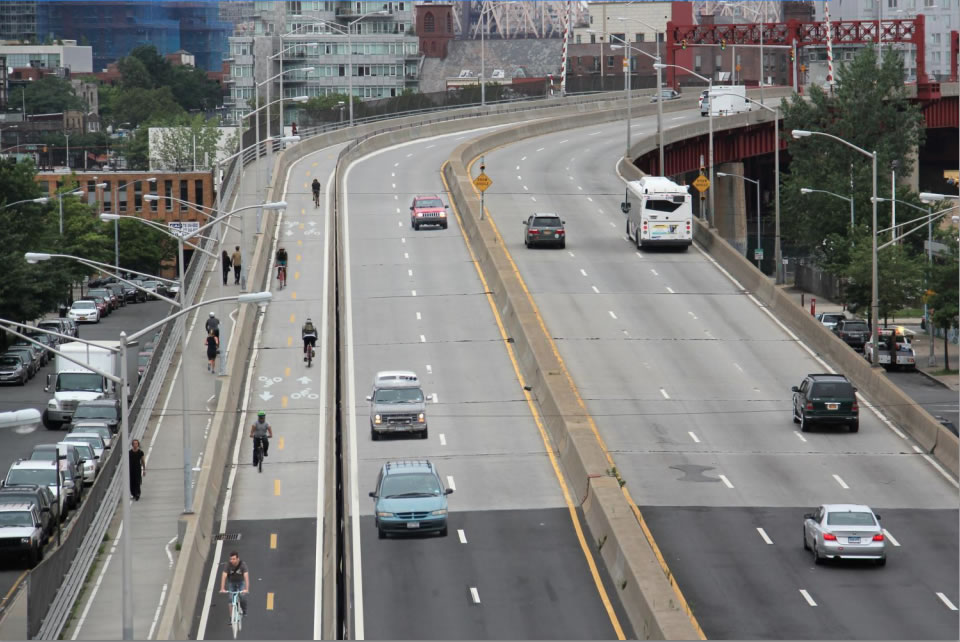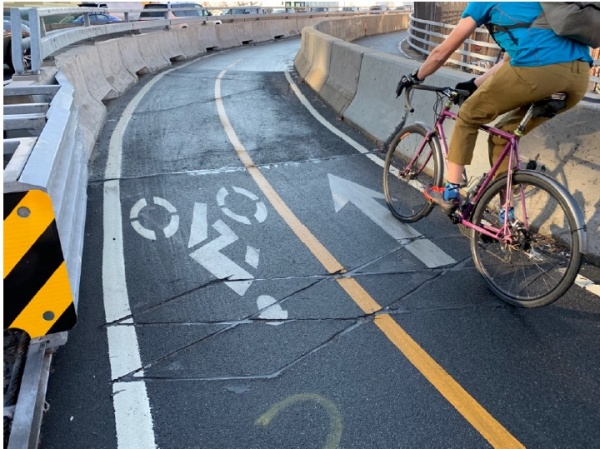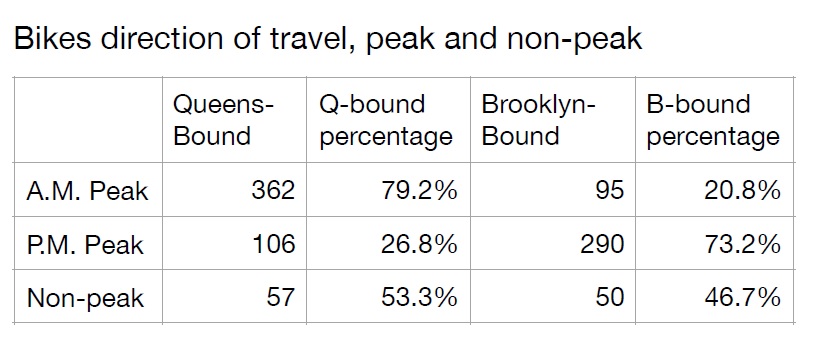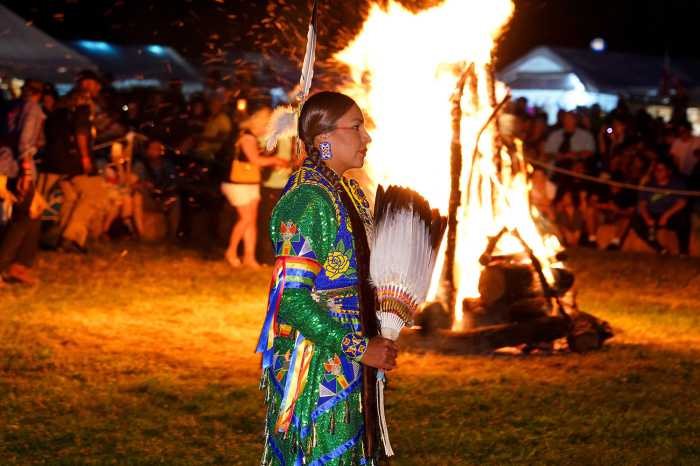
Pulaski Bridge on the Brooklyn Photo: DOT
Dec. 23, 2019 By Michael Dorgan
A bicycle advocacy group has released a study that argues the introduction of the protected bike pathway on the Pulaski Bridge has been a success—although more needs to be done to get cyclist numbers up.
The bridge’s two-way protected bikeway opened in 2016 to improve biking and walking access between Queens and Brooklyn. The 2016 change separated pedestrians and cyclists that had previously shared a congested pathway.
Bike New York, a not-for-profit bicycle advocacy organization, had hoped that bicyclist numbers would have increased much more than they have since 2016.
“We expected the increases to be more because it is such a good facility, although it is a little hard to get to on the Queens side” – Bike New York’s communications director Jon Orcutt said.
The organization did a recent bike count and observed 142 bikes per hour in peak commuting times and 53 bikes per hour in non-peak times in November. The organization counted bikes going in both directions.

Entrance to the Bridge on the Long Island City side (Bike NY)
In April 2013, the city counted an average of 99 bikes per hour—in both directions– over a 12 hour period when cyclists and pedestrians shared a path. Peak time data was not available for this story.
The months of the two counts–April and November–are not peak ridership periods since the weather is cool. The months of May through October are peak cycling periods.
The group, however, wants official DOT data which it claims hasn’t been released since the separate bicycle lanes opened in 2016.
The group has been calling on the DOT to release records from its official counters and make the information publicly available via open data sources.
A DOT spokesperson said that the agency is working on getting the data and that it will be made publicly available “within the next few weeks.”
Bike New York says that ridership on the bridge would be higher if there were “better bike network connections” in Greenpoint and especially in Long Island City, where the “Pulaski Bridge bike path opens into a very busy and complex set of street intersections.”
The study found that the majority of the cyclists crossing the bridge come from Brooklyn. During peak morning hours 80 percent of cyclists on the bridge were riding into Queens. In the evenings, 75 percent of cyclists were riding from Queens into Brooklyn.
 The study found that many bicycle riders from Brooklyn use the bridge to get into Manhattan.
The study found that many bicycle riders from Brooklyn use the bridge to get into Manhattan.
Some ride directly via the Queensboro Bridge while other riders use the bike lane to get to Long Island City subway stations including Vernon-Jackson subway station, where there is a significant amount of bike parking spots available.
However, the organization observed four times as many Citi Bikes used in peak versus off-peak hours which has led to a shortage of Citi Bike docks at Vernon-Jackson and Hunters Point Avenue subway stations in the mornings.
To help alleviate this problem, Bike New York, is calling for Citi Bike docks to be made larger at these stations.
The study also warned that there were some motorized vehicles using the bike pathway that were putting people at risk–and potentially putting bicyclists off using the lanes.
Bike New York said that 7.2 percent of bike lane users consisted of motorized users, most traveling at speeds consistent with bicycle traffic. However, there were a number of e-scooter, Revel and e-bike riders observed traveling at dangerously fast speeds.
Bike New York is urging city officials to monitor this trend to make sure the bike lane is safe.
Pulaski Bridge Bikeway Study November 2019 – Bike NY by Queens Post on Scribd
16 Comments







Loads of ebikes and scooters on the bike path, very dangerous to bikers! Also on the Williamsburg and 59th street bridge. Makes no sense!!
Keep your privately owned bicycle clean and safe.
Perhaps “polish” or “dust” it once in a while.
“Oil” the gears for reasons of safety.
Tighten the “bolts” on a regular basis.
Men and women can live in harmony
and mutual understanding, if they
really choose to do so.
“However, there were a number of e-scooter, Revel and e-bike riders observed traveling at dangerously fast speeds,” is more than true. There were two fatalities at the foot of the bridge on the Brooklyn side. Why? Riders have to track the cars who turn right, straight onto a one-way street, and riders apparently cannot, at speed. Instead, riders who are intent on gaining McGuinness Boulevard, keep going, are hit.
Needed: a true traffic signal, or flashing lights and signage warning for bike riders. Perhaps traffic signals–yellow–or signage to cars warning of bikes coming fast. Seeing a white bike draped in flowers, chained to a post let me know of two deaths.
Seeing a Brooklyn side policeman and car using radar to catch and ticket cars going insanely fast straight off the bridge onto McGuiness, is good, but there has to be another set of warnings, somehow.
Bikes can be used seven months of the year, tops. (And unlimited Ubers and their ilk are the reason Manhattan is rapidly becoming uninhabitable, bike unfriendly, causing resentments, bad manners, danger at every corner. Cap the number!)
The bridge is high
Civilized men and women
can “get along” if they really want to.
Bicycles deserve consideration. Cars do also.
Be careful. Drive defensively.
It’s your World…. be careful where you go to.
There were bicycles before there were cars in the United States and Europe.
A better form of transportation…………….for anyone.
The left has no endgame. Any concessions made will never be enough.
this is an article about bike lanes…
ok boomer
the discrepancy can be attributed to bikes being stolen in Queens
The DOT and the moronic mayor have forgotten who pays NYS and NYC! Let’s review people – bicyclists and people on skateboards and motorscooters DO NOT!!! pay for registration, inspection, drivers licenses, muni meters and tolls and most importantly, insurance!! If they hit somebody because they don’t believe in red lights or stop signs, who’s going to pay the medical bills – not them! Cars, trucks, buses and cabs have to pay those fees. These fees are supposed to be used to fix roads and bridges. Where exactly are these repairs being done? Not in the boroughs. Thousands of parking spaces have been taken away to make room for the, maybe, few hundred of bicyclists in this city. You want to ride your bike – do it in a park. Streets are for trucks to make deliveries and people to get to work who can’t afford the LIRR, MetroNorth and the NJ lines. Even the taxes on parking garages come to about 10+%. Polly (DOT) needs to go and DeButthead, needs to follow her.
>Thousands of parking spaces have been taken away
You should pay to park your private property, sorry this is America not soviet russia
>the, maybe, few hundred of bicyclists in this city
Citbike reported 90,000 riders in ONE DAY. If you had any information at all maybe your feelings wouldn’t be hurt.
I used to ride this bridge all the time to get to Brooklyn since the Greenpoint Avenue Bridge is just too dangerous to get to. Now I take the BQE and Kosciusko Bridge more often, but thank goodness politicians are looking out for bikers. Meanwhile, waiting for car lovers to trash anything that makes NYC safer and more fair for others.
However, there were a number of e-scooter, Revel and e-bike riders observed traveling at dangerously fast speeds. How else will the wealthy get their Doordash order on time? It’s all about convenience
Who needs data? The car-hating cabal entrenched at the DoT don’t actually care about bikes! What they care for is to make the life of NYC drivers as difficult, costly and painful as possible. They would install dedicated donkey lanes, as far as they at the DoT are concerned. Their main goal is to take away car lanes! Aren’t you glad we, the tax-paying FOOLS of NYC, are paying for all this car-hating madness? Remember to vote!
Use a car if you must, but be prepared to be levied to do so. There are too many cars, too many non-essential journeys, too many sole-occupancy journeys. Gridlock chokes cities. PS, I am a car owner but I only use it for entire family outings or longer journeys out of the city. For everything else I use public transport, my legs, and a bicycle.
Are you really gonna enough to belive that?
Once a street is resurfaced, it becomes a protected street for five years. DOT will not issue street opening permits.
The majority of their money is spent on roads. But they’re anti car…